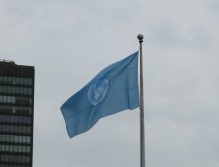Allegations that chemical weapons have been used in Syria have prompted the United Nations to investigate the claims, with a team being put together to visit the country. According to UN Secretary-General spokesman Martin Nesirky, the team will be working to determine if the weapons of mass destruction have been used, not to cast blame on which side used them.
“It is not the role of this mission to apportion responsibility or blame,” a UN transcript of Nesirky’s comments quoted him as saying Wednesday. “As I said yesterday, it is not a criminal investigation; it is looking at whether chemical weapons were used and not by whom.”
Syria is believed to possess one of the largest stockpiles of chemical weapons in the world, and Western and regional nations have expressed concern about the weapons being used in the Syrian civil war or reaching terrorists. The Syrian civil war began as a government crackdown on peaceful protestors more than two years ago. Since then, more than 70,000 people have been killed in the fighting.
The UN investigation team will be headed by Professor Ǻke Sellström of Sweden, who according to a UN press release served previously as a senior advisor to commission looking into the disarmament of Iraq.
According to the UN News Centre, Sellström told an interview with UN Radio that the mission to Syria would begin in a “week’s time or so.”
US spokesperson Patrick Ventrell did not specify if the US believes the claims by rebels that the regime has used chemical weapons. “It’s going to be up to the UN to determine what they think is credible. They’ll have the technical expertise and they’ll go into the country,” Ventrell was quoted by the State Department website as telling reporters on Wednesday.
Ventrell did call upon the Syrian regime to cooperate fully with the investigation. “The Assad regime can prove that its request for investigation is genuine by fully cooperating with the UN, by providing them with access and security, and allowing the Secretary-General’s team to complete their work. Absolutely I think that’s critical.”
(By Joshua Spurlock, www.themideastupdate.com, March 27, 2013)

